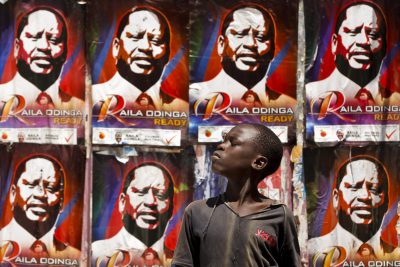Dai Kurokawa/EPA
By
Joe Khamisi
Is this the silly season in Kenya’s political scene? It looks that way given the circus that is playing out almost a year before the general elections.
For those who know the East African country this is not unusual. Every time an election approaches, temperatures rise to decibel levels; politicians shift alliances, title deeds are hurriedly issued to squatters, women and youth projects are revived, deals are struck, and money – lots of it – begins to change hands. The term “MPs for hire” is already buzzing in the social media.
General elections are not until August 2017 but politicians have already begun to reposition themselves. In recent weeks, the country has witnessed high level defections. Both the secretary general and the vice chairman of Raila‘s Orange Democratic Party (ODM) have jumped ship and are creating a “third force” to take on the ruling Jubilee and the opposition CORD.
On the other side of the isle, dozens of followers from Ruto‘s Rift Valley have decamped to the opposition leaving the region – which in 2013 voted for Uhuru Kenyatta almost to a man – up for grabs.
This intense flip-flopping drama is leaving the two big coalitions with no time to prepare for the polls, which could see Uhuru either earn a second term, or go home tagging the shameful reputation as the first one-term president in Kenya’s history.
In 2013, Uhuru and Ruto were quite comfortable using the Jubilee Alliance as their political vehicle against the opposition. This time around they want to ride on something called Jubilee Party. The only difference between the two, as far as I can see, is that the former had four coalition partners while the new arrangement is expected to attract up to 13 parties from across the country.
This past week, Uhuru signed a Bill clearing the way for the merger to take place, but things are not turning out to be that simple. Some of the partners are either reluctant to commit or are unwilling to disband their parties – which is a condition for joining the coalition – fearing a backlash from their grass-root supporters.
This internal revolt, which Jubilee would like to keep under wraps, presents a gigantic challenge to Uhuru who wants the matter sorted out quickly so that the coalition can concentrate on party strategies including the process of setting up a central command post and regional teams.
However, as Jubilee struggles to mend its holes, CORD is sitting on a crisis. With three equal partners each desiring to occupy the seat on the hill, the challenge of selecting one presidential candidate has become tricky and could be politically damaging. Raila; Kalonzo Musyoka of the Wiper Party; and Moses Wetangula of Ford Kenya, are yet to sit and agree on who is to take on Uhuru. The sooner they do that, the better. For now, the matter remains a hot potato.
But lack of a presidential candidate is not the only problem facing the opposition. Due to internal feuds, the ODM party headquarters is a house divided. The fact that the two departing officials come from western Kenya is enough to worry the former Prime Minister. The region has been a strong opposition stronghold for years and in 2013 western Kenya voted overwhelmingly for Raila. The situation is likely to be different next year.
So as we speak ODM – and to a large extent CORD is disoriented and rudderless. The party is spending a lot of time sorting out its internal problems and not enough time executing the all-important task of voter mobilization.
However, the silliest thing this season in Kenyan politics, has to do with Ruto’s presidential ambitions. According to Jubilee, Uhuru is to pass the baton to Ruto in 2022 if, in fact, he wins next year. Unfortunately for the deputy president this proposed arrangement is facing headwinds from some Jubilee leaders, especially those from Uhuru’s home ground. They are warning that Kikuyus would not vote for Ruto, a Kalenjin, in 2022,even though Kalenjins supported Uhuru in 2013. This is an ominous signal to Ruto and sends only one clear message: that he cannot expect an automatic elevation to the highest office after Uhuru.
In one of my earlier articles I said Ruto will need more than Uhuru’s nod to ascend to power. My view has not changed.
Anyone who has watched voting patterns in Kenya over the years will advise Ruto to tread very, very carefully, as he proceeds to the next level in his dramatic political career.
Joe Khamisi
Joe Khamisi is a former journalist, diplomat and Member of Parliament. He is also the Author of ‘Politics of Betrayal:Diary of a Kenyan Legislator‘, a political memoir about the situation in Kenya between 2001, when the ruling party of President Daniel Arap Moi, the Kenya African National Union (KANU), merged with Raila Odinga’s National Development Party.
The book also narrates cases of corruption in Parliament and in the Media and records Senator Obama’s visit to Kenya in 2006. As a friend of Barack Obama Senior, the author also remembers the times and tragedies of the American-educated economist.
Joe Khamisi’s second book, a biography, ‘Dash Before Dusk’ is also now on sale.
Joe’s latest book is ‘The Wretched Africans: A Study of Rabai and Freretown Slave Settlements‘ which has recently been published and is now available to purchase.






No Comments Yet!
You can be first to comment this post!